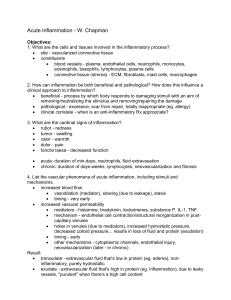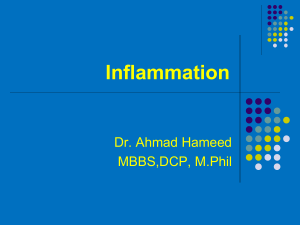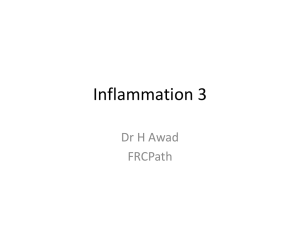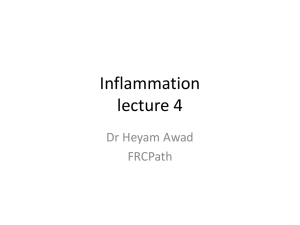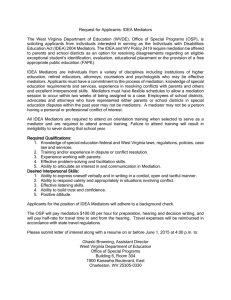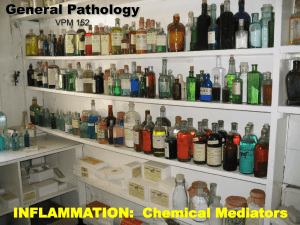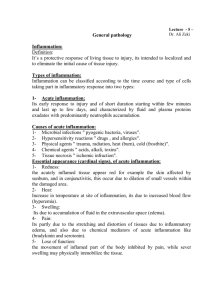Acute inflammatio - 3
advertisement
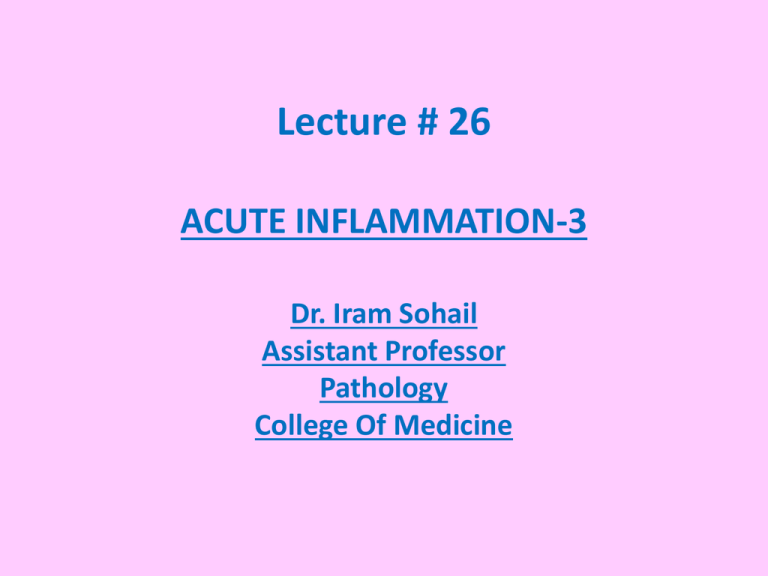
Lecture # 26 ACUTE INFLAMMATION-3 Dr. Iram Sohail Assistant Professor Pathology College Of Medicine OBJECTIVES • Chemical mediators of inflammation – Cell derived mediators – Plasma protein derived mediators CHEMIAL MEDITORS OF INFLAMMATION • Chemical mediators are substances which are responsible for the events of inflammation. • They may be produced locally at the site of inflammation or synthesized in liver and then secreted in circulation. There are 2 types of mediators • Cell derived mediators • Plasma protein derived mediators CELL DERIVED MEDIATORS They are produced by • Mast cells • Endothelial cells • Tissue macrophages • WBCs Cell derived mediators are • Histamine • Serotonin • Prostaglandins (PG) • Leukotrienes • Platelet activating factor (PAF) • Reactive oxygen species • Nitric oxide • Cytokines • Neuropeptides • These are different cell derived mediators and their sources. • Different actions of cell derived mediators of inflammation Mediator Source Principal Actions Histamine Mast cells, basophils, platelets Vasodilation, increased vascular permeability, endothelial activation Serotonin Platelets Vasodilation, increased vascular permeability Prostaglandins Mast cells, leukocytes Vasodilation, pain, fever Leukotrienes Mast cells, leukocytes Increased vascular permeability, chemotaxis, leukocyte adhesion and activation Cell-Derived Platelet-activating factor Leukocytes, endothelial cells Vasodilation, increased vascular permeability, leukocyte adhesion, chemotaxis, degranulation, oxidative burst Reactive oxygen species Leukocytes Killing of microbes, tissue damage Nitric oxide Endothelium, macrophages Vascular smooth muscle relaxation; killing of microbes Cytokines (e.g. TNF, IL-1) Macrophages, lymphocytes, endothelial cells, mast cells Local endothelial activation (expression of adhesion molecules), systemic acutephase response; in severe infections, septic shock Chemokines Leukocytes, activated macrophages Chemotaxis, leukocyte activation • Arachidonic acid metabolites (PG & LTs) formation and their roles in inflammation • Principle inflammatory actions of Arachidonic acid metabolites Action Eicosanoid Vasodilation PGI2 (prostacyclin), PGE1, PGE2, PGD2 Vasoconstriction Thromboxane A2, leukotrienes C4, D4, E4 Increased vascular permeability Leukotrienes C4, D4, E4 Chemotaxis, leukocyte adhesion Leukotriene B4 Major cytokines in the acute inflammation are • Tumor necrosis factor (TNF) & • Interleukin-1 (IL-1) PLASMA PROTEIN DERIVED MEDIATORS • Plasma protein derived mediators are involved in many inflammatory reactions. Plasma protein mediators are A. Complements B. Coagulation & kinin system A. Complements • Complement system is composed of plasma proteins and plays an important role in events of inflammation. In plasma these complements are present in inactive form. • They activated by 2 pathways i. Classical pathway ii. Lectin pathway The main complements are 1. C3a, C5a • Causes – increased vascular permeability & vasodilation – also called anaphylotoxins 2. C5a • Causes – Leukocytes activation, adhesion & Chemotaxis 3. C3b • Causes – Opsonization & phagocytosis B. Coagulation & kinin system • Summary of cell derived & plasma protein mediators of inflammation
